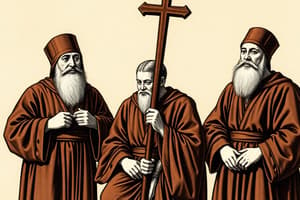Podcast
Questions and Answers
What was the term used for the chief in a barangay during Pre-Spanish government?
What was the term used for the chief in a barangay during Pre-Spanish government?
- Capitan
- Datu (correct)
- Alcalde-mayor
- Gobernadorcillo
Which of the following titles was used for the head of provinces during the Spanish colonial government?
Which of the following titles was used for the head of provinces during the Spanish colonial government?
- Alcalde-mayor (correct)
- Datu
- Visitador General
- Cabeza de barangay
What was the primary characteristic of the government system employed by the Spaniards in the Philippines?
What was the primary characteristic of the government system employed by the Spaniards in the Philippines?
- Confederation
- Federal structure
- Unitary system (correct)
- Decentralized governance
Who exercised the highest power in the Philippine Islands during the Spanish colonial period?
Who exercised the highest power in the Philippine Islands during the Spanish colonial period?
What was the role of the Visitador General in the Spanish colonial government?
What was the role of the Visitador General in the Spanish colonial government?
Which entity served as an advisory body to the Governor-General during the Spanish colonial period?
Which entity served as an advisory body to the Governor-General during the Spanish colonial period?
What was the term for the consolidation of barangays into municipalities during Spanish rule?
What was the term for the consolidation of barangays into municipalities during Spanish rule?
Which group had significant administrative powers during the Spanish colonial government?
Which group had significant administrative powers during the Spanish colonial government?
What was the purpose of the Jones Law of 1916?
What was the purpose of the Jones Law of 1916?
Who was the chairman of the Philippine Executive Commission during the Japanese Occupation?
Who was the chairman of the Philippine Executive Commission during the Japanese Occupation?
Which document provided for a 10-year transition period for the Philippines towards independence?
Which document provided for a 10-year transition period for the Philippines towards independence?
What was a significant feature of the governance system under the Japanese-sponsored Second Republic?
What was a significant feature of the governance system under the Japanese-sponsored Second Republic?
What was the focus of the Local Autonomy Act of 1959?
What was the focus of the Local Autonomy Act of 1959?
When was the Fourth Republic officially proclaimed under the 1973 Constitution?
When was the Fourth Republic officially proclaimed under the 1973 Constitution?
What did Article VII, Section 10 of the 1935 Constitution specify about local governments?
What did Article VII, Section 10 of the 1935 Constitution specify about local governments?
What was the primary aim of the Decentralization Act of 1967?
What was the primary aim of the Decentralization Act of 1967?
What role did encomenderos play during the early Spanish period in the Philippines?
What role did encomenderos play during the early Spanish period in the Philippines?
Which council was responsible for the judicial power in the Katipunan government?
Which council was responsible for the judicial power in the Katipunan government?
What significant impact did the American Military Government have on local governance terminology?
What significant impact did the American Military Government have on local governance terminology?
What was a key feature of the First Philippine Republic's approach to governance?
What was a key feature of the First Philippine Republic's approach to governance?
Which commission investigated Philippine conditions during the American period?
Which commission investigated Philippine conditions during the American period?
What was the primary function of the Philippine Bill of 1902?
What was the primary function of the Philippine Bill of 1902?
In what year did American military rule begin in the Philippines?
In what year did American military rule begin in the Philippines?
What title was given to those who owned vast lands during the mid to late Spanish period?
What title was given to those who owned vast lands during the mid to late Spanish period?
What was the outcome of the L-36142 case regarding Proclamation No. 1102?
What was the outcome of the L-36142 case regarding Proclamation No. 1102?
What significant power did Letter of Instruction (LOI) 356 grant to President Marcos in 1975?
What significant power did Letter of Instruction (LOI) 356 grant to President Marcos in 1975?
How did the 1987 Constitution impact the national government's relationship with local government units?
How did the 1987 Constitution impact the national government's relationship with local government units?
What does Article II, Section 5 of the 1987 Constitution state about local governments?
What does Article II, Section 5 of the 1987 Constitution state about local governments?
What was a direct consequence of the martial law during Marcos' regime on local governance?
What was a direct consequence of the martial law during Marcos' regime on local governance?
What is a notable feature of the Local Government Code of 1991 as stated in Article X, Section 3?
What is a notable feature of the Local Government Code of 1991 as stated in Article X, Section 3?
During President Marcos' presidency, what administrative adjustment was referred to as 'regionalization'?
During President Marcos' presidency, what administrative adjustment was referred to as 'regionalization'?
What did Article XI of the 1973 Constitution focus on regarding governance?
What did Article XI of the 1973 Constitution focus on regarding governance?
Study Notes
Pre-Spanish Government
- Barangay: A term derived from the Malayan word for "boat", each barangay was led by a chief termed datu, rajah, sultan, or apo, depending on the region.
- The datu wielded executive, legislative, and judicial powers.
Spanish Government (1521 – 1898)
- Colonial Structure: A unitary system with centralized power in the Philippines; barangays were transformed into barrios.
- Governance Titles: Datus who collaborated with Spaniards became cabeza de barangay; municipalities were overseen by gobernadorcillos (mayors) and provinces by alcalde-mayor.
- Central Authority: The Governor-General held supreme power, serving in various roles, including military commander and vice-royal patron.
- Administrative Officials: The Visitador General reported to the King, while the Royal Audiencia audited colonial activities and handled grievances against the Governor-General.
- Frailocracy: Spanish friars took on administrative positions, melding religious authority with governance.
- Economic Systems: Encomiendas (land grants to helpers) and haciendas (large landholdings) structured the agrarian economy.
Philippine Revolution & First Philippine Republic
- Katipunan Government: Founded by Andres Bonifacio, it created a Supreme Council and local councils to exercise governmental functions.
- First Philippine Republic: Established under the Malolos Constitution, emphasizing centralism for island unity.
American Period
- Military Government: Began after the Spanish-American War; maintained a centralized governance similar to the Spanish system.
- Transition to Civil Government: Schurman and Taft Commissions urged U.S. sovereignty; the Philippine Bill of 1902 initiated a legislative body.
- Jones Law of 1916: Promised independence assistance.
- Commonwealth Government: Tydings-McDuffie Law initiated a transitional governance structure for independence over ten years.
Japanese Occupation & the Second Republic
- Philippine Executive Commission: Established during Japanese control, led by Jorge B. Vargas; governance remained centralized.
Third Republic (1935 Constitution)
- Established Independence: Formally inaugurated on July 4, 1946, yet retained centralism with emphasis on local government supervision by the President.
- Legislative Contributions:
- Barrio Charter of 1959 legitimized barrios.
- Local Autonomy Act of 1959 expanded local government powers.
- Decentralization Act of 1967 improved financial resources for local governments.
Fourth Republic (1973 Constitution)
- Parliamentary System: Instituted by Ferdinand Marcos; significant power centralized under the presidency.
- Judiciary and Governance Changes: The Supreme Court's ruling in Javellana v. Executive Secretary validated the 1973 Constitution.
- Martial Law Implications: Enhanced presidential control over local governments, enabling direct appointments based on performance.
- Regionalization: Implemented administrative regionalization to streamline local government services.
Fifth Republic (1987 Constitution)
- Local Autonomy: The national government became more responsive to local governments, ensuring local autonomy under Article II, Section 5 of the 1987 Constitution.
- Local Government Code of 1991 (Republic Act No. 7160): Established mechanisms for effective local governance and decentralized authority, reinforcing accountability in local government systems.
Studying That Suits You
Use AI to generate personalized quizzes and flashcards to suit your learning preferences.
Related Documents
Description
Explore the evolution of governance in the Philippines from the pre-Spanish barangay system to the centralized Spanish colonial government. Learn about the roles of local leaders and administrative structures that shaped the nation's political landscape during this period. This quiz covers essential terms and concepts that define Philippine history from 1521 to 1898.




